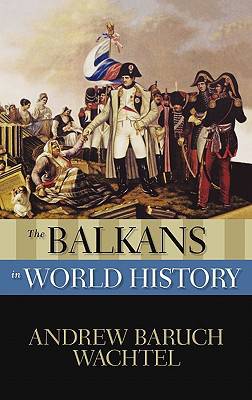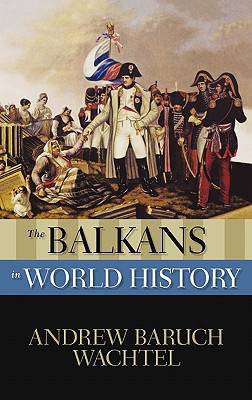
- Afhalen na 1 uur in een winkel met voorraad
- Gratis thuislevering in België vanaf € 30
- Ruim aanbod met 7 miljoen producten
- Afhalen na 1 uur in een winkel met voorraad
- Gratis thuislevering in België vanaf € 30
- Ruim aanbod met 7 miljoen producten
Zoeken
€ 225,95
+ 451 punten
Uitvoering
Omschrijving
In the historical and literary imagination, the Balkans loom large as a somewhat frightening and ill-defined space, often seen negatively as a region of small and spiteful peoples, racked by racial and ethnic hatred, always ready to burst into violent conflict. The Balkans in World History re-defines this space in positive terms, taking as a starting point the cultural, historical, and social threads that allow us to see this region as a coherent if complex whole. Eminent historian Andrew Wachtel here depicts the Balkans as that borderland geographical space in which four of the world's greatest civilizations have overlapped in a sustained and meaningful way to produce a complex, dynamic, sometimes combustible, multi-layered local civilization. It is the space in which the cultures of ancient Greece and Rome, of Byzantium, of Ottoman Turkey, and of Roman Catholic Europe met, clashed and sometimes combined. The history of the Balkans is thus a history of creative borrowing by local people of the various civilizations that have nominally conquered the region. Encompassing Bulgaria, Croatia, Bosnia and Herzegovina, Serbia, Montenegro, Albania, Macedonia, Greece, and European Turkey, the Balkans have absorbed many voices and traditions, resulting in one of the most complex and interesting regions on earth.
Specificaties
Betrokkenen
- Auteur(s):
- Uitgeverij:
Inhoud
- Aantal bladzijden:
- 176
- Taal:
- Engels
- Reeks:
Eigenschappen
- Productcode (EAN):
- 9780195158496
- Verschijningsdatum:
- 5/11/2008
- Uitvoering:
- Hardcover
- Formaat:
- Genaaid
- Afmetingen:
- 160 mm x 236 mm
- Gewicht:
- 408 g

Alleen bij Standaard Boekhandel
+ 451 punten op je klantenkaart van Standaard Boekhandel
Beoordelingen
We publiceren alleen reviews die voldoen aan de voorwaarden voor reviews. Bekijk onze voorwaarden voor reviews.











